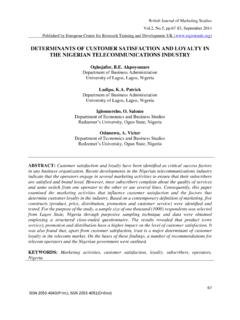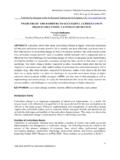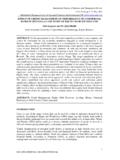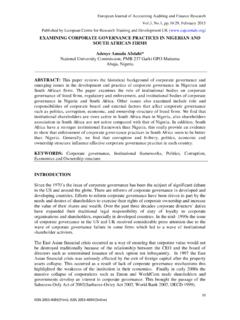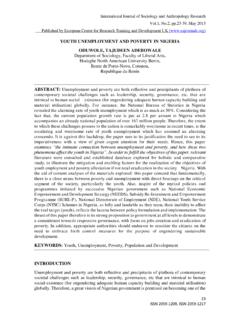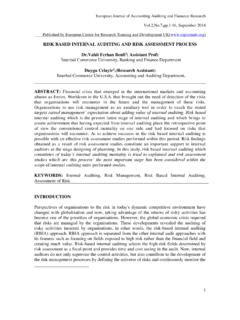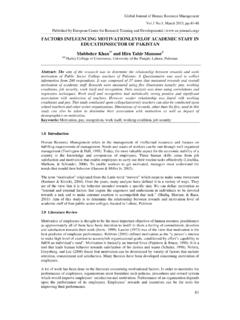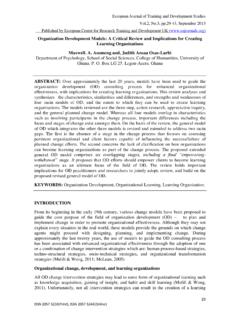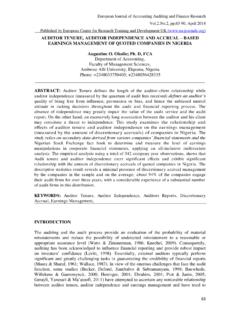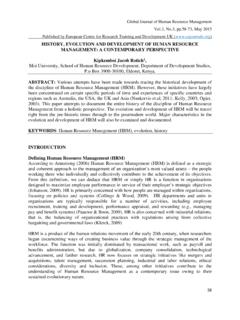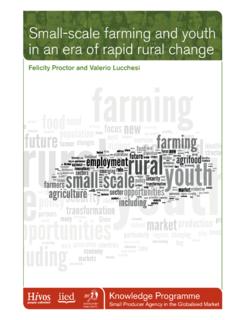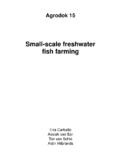Transcription of A REVIEW OF SMALLHOLDER FARMING IN NIGERIA: NEED …
1 International Journal of Agricultural Extension and Rural Development Studies , , , May 2016. ___Published by European Centre for Research Training and Development UK ( ). A REVIEW OF SMALLHOLDER FARMING IN nigeria : NEED FOR. TRANSFORMATION. R. N. Mgbenka1 and Mbah2. 1. Department of Agricultural Extension, University of nigeria , Nsukka, nigeria 2. Department of Agricultural Extension and Communication, University of Agriculture, Makurdi, nigeria ABSTRACT: By international standards, a farm that is less than 10 hectares is classified as small scale. More than 80% of farmers in nigeria are small holder farmers. Agriculture is a major contributor to nigeria 's Gross Domestic Product (GDP) and SMALLHOLDER farmers play a dominant role in this contribution.
2 A small scale farmer depends on his efficiency in the utilization of basic production resources available to him. He makes a significant and important contribution to the national product, about 99%of total crops output. The SMALLHOLDER farmer is the main producer of 98% of the food consumed in nigeria with the exception of wheat. Over the years, deliberate efforts have been made to improve agricultural production by Nigerian governments and some foreign bodies but these efforts have not yielded expected results. Much of the failure can be attributed to different constraints that militate against SMALLHOLDER FARMING in nigeria which include economic, political and financial constraints.
3 The failure can also be attributed to the adapted transformation approach to agriculture which is characterized by the introduction of a wide variety of large scale FARMING and processing technologies. The emphasis is now from the big scale transformation approach to the small scale improvement strategy approach which is attuned to Nigerian age-long farm practice. This study reveals certain constraints militating against efficiency in SMALLHOLDER FARMING in nigeria and suggests many ways to transform the activities of farmers for enhanced productivity. The paper recommends that Nigerian governments should encourage the participation of private sector in supplying farm inputs to ensure steady and timely supply of such inputs, Nigerian Agricultural Extension System should be revamped by funding arrangement to provide mobility, training, incentives and institutional support so that it will increase its services to farmers for enhanced production, among others.
4 KEYWORDS: SMALLHOLDER Farmers, Agricultural Production, Inefficiency, Transformation, nigeria INTRODUCTION. The cost of producing food in first world countries is extremely high and land is scarce; but on the other hand, sub-Saharan Africa has enormous natural, physical and human potential. The focus of the agricultural finance donor community has shifted away from food aid and is now focused on developing SMALLHOLDER farmers and establishing food security. The stage is being set for food production in Africa to gain momentum. Africa's small farmers are unique in that they generally have access to land that is free (communally held) or can be used at a relatively low cost.
5 This free/low cost land provides farmers with a significantly lower cost structure (Akinsuyi, 2011). 43. Print ISSN: ISSN 2058-9093 Online ISSN: ISSN 2058-910. International Journal of Agricultural Extension and Rural Development Studies , , , May 2016. ___Published by European Centre for Research Training and Development UK ( ). nigeria alone has a land area of million hectares, with 74 million hectares good for FARMING ; yet half of its arable land has not been exploited to produce crops and livestock to stem the threat of hunger and poverty through efficient production system (Opara, 2011). It is obvious that from growth point of view, opportunities exist in Africa's agriculture sector.
6 In nigeria , with SMALLHOLDER farmers no doubt, having a lot to benefit in a situation where there is a favourable operating environment. SMALLHOLDER farmers are the suppliers of food to the tables of Nigerians. In fact, a report has it that more than 80% of the total farmers, including medium and large ones, are SMALLHOLDER farmers (Akinsuyi, 2011). They are the backbone of the Nigerian agriculture sector and deserve every support to produce more food, grow more raw materials for the agro-industrial sector and contribute in ending a food supply deficit that costs the country US$10 million in food import annually. Dambatta (2012) reports that the agricultural transformation component of the transformation agenda of the administration of President Good luck Ebele Jonathan is expected to generate at least million jobs through the value chains of various commodities and turn agriculture into business that can create wealth for farmers.
7 They operate at subsistence, SMALLHOLDER level, with intensive agriculture being uncommon. A characteristic feature of the agricultural production system in nigeria is that a disproportionately large fraction of the agricultural output is in the hands of these SMALLHOLDER farmers whose average holding is about hectares. According to Federal Office of Statistics (1999), SMALLHOLDER farmers are farmers whose production capacity falls between and hectares holding. There is very limited access to modern improved technologies and their general circumstance does not always merit tangible investments in capital, inputs and labour.
8 Agriculture sector being a major employer in nigeria not-withstanding yet provides a decreasing contribution to National Gross Domestic Product (GDP). Certain factors are responsible for these inefficiencies in small scale FARMING in nigeria . This has come about through the persisting dry conditions that small holder farmers experience. These farmers lack agriculture information and this is a factor that promotes ignorance of modern farm technologies in the farmers hence the constraint requires more attention than it now gets. These farmers also operate under high costs of production that affects both the commercial and SMALLHOLDER farmer and most importantly other constraints against small holder farmer.
9 SMALLHOLDER farmers in nigeria have limited access to credit facilities which reduces their productivity to a great extent. In spite of the fact that nigeria has a lot of cultivable land, a great percentage of it is being converted to other uses than agriculture. One of the most destructive factors that hinder productivity in SMALLHOLDER FARMING is lack of market which impoverishes and discourages them from production. In addition to these challenges, Obiechina (2012) points out that the main reason for poor performances of SMALLHOLDER farmers is due to lack of commitment by all tiers of governments to implement the right policies.
10 The paper therefore reviews SMALLHOLDER FARMING in nigeria : Need for transformation;. examines different constraints that contribute to the ineffectiveness of SMALLHOLDER farmers in nigeria . It also discusses sources of information to small holder farmers on their different production needs, proposes some solutions to these constraints. Some recommendations for transformation of small holder FARMING in nigeria were also made. 44. Print ISSN: ISSN 2058-9093 Online ISSN: ISSN 2058-910. International Journal of Agricultural Extension and Rural Development Studies , , , May 2016. ___Published by European Centre for Research Training and Development UK ( ).
